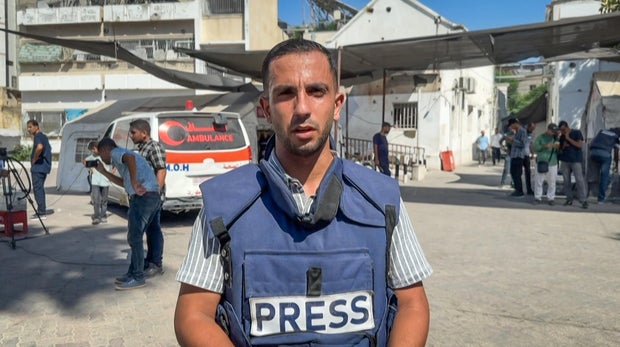Israel’s military targeted and killed five Al Jazeera journalists in Gaza on Sunday, including Al Jazeera correspondent Anas al-Sharif, who only three weeks earlier had appealed to the Committee to Protect Journalists over fears he might be assassinated.
Al-Sharif began reporting for Al Jazeera a few days after the war began in 2023. He was known for reporting on Israel’s bombardment in northern Gaza, and later for covering the hunger gripping much of the territory’s population.
In a July broadcast, al-Sharif cried on air as a woman behind him collapsed, apparently from malnutrition.
“I am talking about slow death of those people,” he said in the report.
Israel took responsibility for the strike, claiming al-Shariff was a leader of a Hamas cell — an allegation that Al Jazeera and al-Shariff had previously dismissed as baseless, The Associated Press reported. The incident marked the first time during the war that Israel’s military has swiftly claimed responsibility after a journalist was killed in a strike.
Since the war began, Israel has refused to allow international journalists into Gaza, apart from rare invitations to observe Israeli military operations with IDF escorts— meaning the burden of documenting the war there has fallen on Palestinian journalists inside the Strip. That work has been deadly: At least 178 Palestinian journalists and media workers have been killed during the war, according to the Committee to Protect Journalists.
The Foreign Press Association, the oldest association of international journalists in the world, condemned Israel’s targeting of journalists reporting on the war in Gaza.
“Over the past 22 months, the Israeli military has repeatedly labelled Palestinian journalists as militants, often without verifiable evidence, turning them into targets,” the FPA said in a statement on Monday.
The killing of al-Sharif came less than a year after Israeli army officials first accused him and other Al Jazeera journalists of being members of the terrorist groups Hamas and Islamic Jihad.
Al Jazeera called the strike a “targeted assassination” and accused Israeli officials of incitement.
“Anas and his colleagues were among the last remaining voices from within Gaza, providing the world with unfiltered, on-the-ground coverage of the devastating realities endured by its people,” the Qatari network said in a statement.
With international media barred from entering Gaza, Al Jazeera is among the few outlets still fielding a big team of reporters inside the besieged strip, chronicling daily life amid airstrikes, hunger and the rubble of destroyed neighborhoods.
The network has suffered heavy losses during the war, including 27-year-old correspondent Ismail al-Ghoul and cameraman Rami al-Rifi, killed last summer, and freelancer Hossam Shabat, killed in an Israeli airstrike in March.
Like al-Sharif, Shabat was among the six that Israel accused of being members of militant groups last October.
Hundreds of people, including many journalists, gathered Monday to mourn al-Sharif, Qureiqa and their colleagues. Their bodies lay wrapped in white sheets at Gaza City’s Shifa Hospital complex.
AFP/AFPTV/AFP via Getty Images
Ahed Ferwana of the Palestinian Journalists Syndicate said reporters were being deliberately targeted and urged the international community to act.
Al-Sharif reported a nearby bombardment minutes before his death. In a social media post that Al Jazeera said was written to be posted in case of his death, he bemoaned the devastation and destruction that war had wrought and bid farewell to his wife, son and daughter.
“I never hesitated for a single day to convey the truth as it is, without distortion or falsification,” the 28-year-old wrote.
The journalists are the latest to be killed in what observers have called the deadliest conflict for journalists in modern times. The Committee to Protect Journalists said on Sunday that at least 186 have been killed in Gaza, and Brown University’s Watson Institute in April said the war was “quite simply, the worst ever conflict for reporters.”
Irene Khan, the U.N. Special Rapporteur on freedom of expression, on July 31 said that those killings were “part of a deliberate strategy of Israel to suppress the truth, obstruct the documentation of international crimes and bury any possibility of future accountability.”
The Committee to Protect Journalists said on Sunday that it was appalled by the strike.
“Israel’s pattern of labeling journalists as militants without providing credible evidence raises serious questions about its intent and respect for press freedom,” Sara Qudah, the group’s regional director, said in a statement.
Al Jazeera is blocked in Israel and soldiers raided its offices in the occupied West Bank last year, ordering them closed.
Debora Patta and
Haley Ott
contributed to this report.



